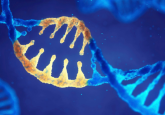How can CRISPR edit out antimicrobial resistance?

The growing threat of antimicrobial-resistant bacteria is calling upon researchers to find alternative ways to treat these infections. Cue CRISPR-Cas technology.
Antimicrobial resistance (AMR) is becoming increasingly more threatening. At this year’s European Society of Clinical Microbiology and Infectious Diseases Global Congress (27–30 April; Barcelona, Spain), research was presented highlighting the use of CRISPR-Cas technology to genetically modify AMR bacterial infections.
CRISPR-Cas earned Jennifer Doudna and Emmanuelle Charpentier the Nobel Prize in Chemistry in 2020 for its ability to target and modify specific segments of genetic code. Now, this molecular scissor technique is being chaperoned by guide RNA to sites on antimicrobial-resistant bacteria’s DNA to interrupt their ability to resist antimicrobials. By doing so, it can help make them responsive to existing antimicrobials.

Could carrying multiple copies of antibiotic-resistance genes be a driver of resistance spread?
Carrying multiple copies of antibiotic-resistance genes could be key to resistance spread and evolution in bacteria, particularly those in humans and livestock.
Presenter and researcher Rodrigo Ibarra-Chávez (University of Copenhagen, Denmark) explains that they are “fighting fire with fire, we are using CRISPR-Cas systems (a bacterial immunity system) as an innovative strategy to induce bacterial cell-death or interfere with antibiotic resistance expression – both hold promise as novel sequence-specific targeted ‘antimicrobials’.”
The team is using mobile genetic elements in the form of bacteriophage satellites – parasites of phages – to reach their target bacterium. These satellites ensure phages’ viral particles are transmitted to host bacterial cells, infecting these cells rather than destroying them, as phages would. The team plans to utilize these satellites as delivery systems for their CRISPR-Cas technology, allowing the CRISPR machinery to attack antimicrobial resistance genes.
However, bacteria will likely find ways to resist satellites’ entry and infection, requiring researchers to remain vigilant. Studies have shown that fighting antimicrobial resistance will require multi-pronged approaches, including phages, antibiotics and CRISPR-Cas. Ibarra-Chávez concluded: “Bacteria are particularly good at adapting and becoming resistant. I believe we need to be cautious and try using combinatorial strategies to avoid the development of resistance, while monitoring and creating guidelines of new technologies.”





